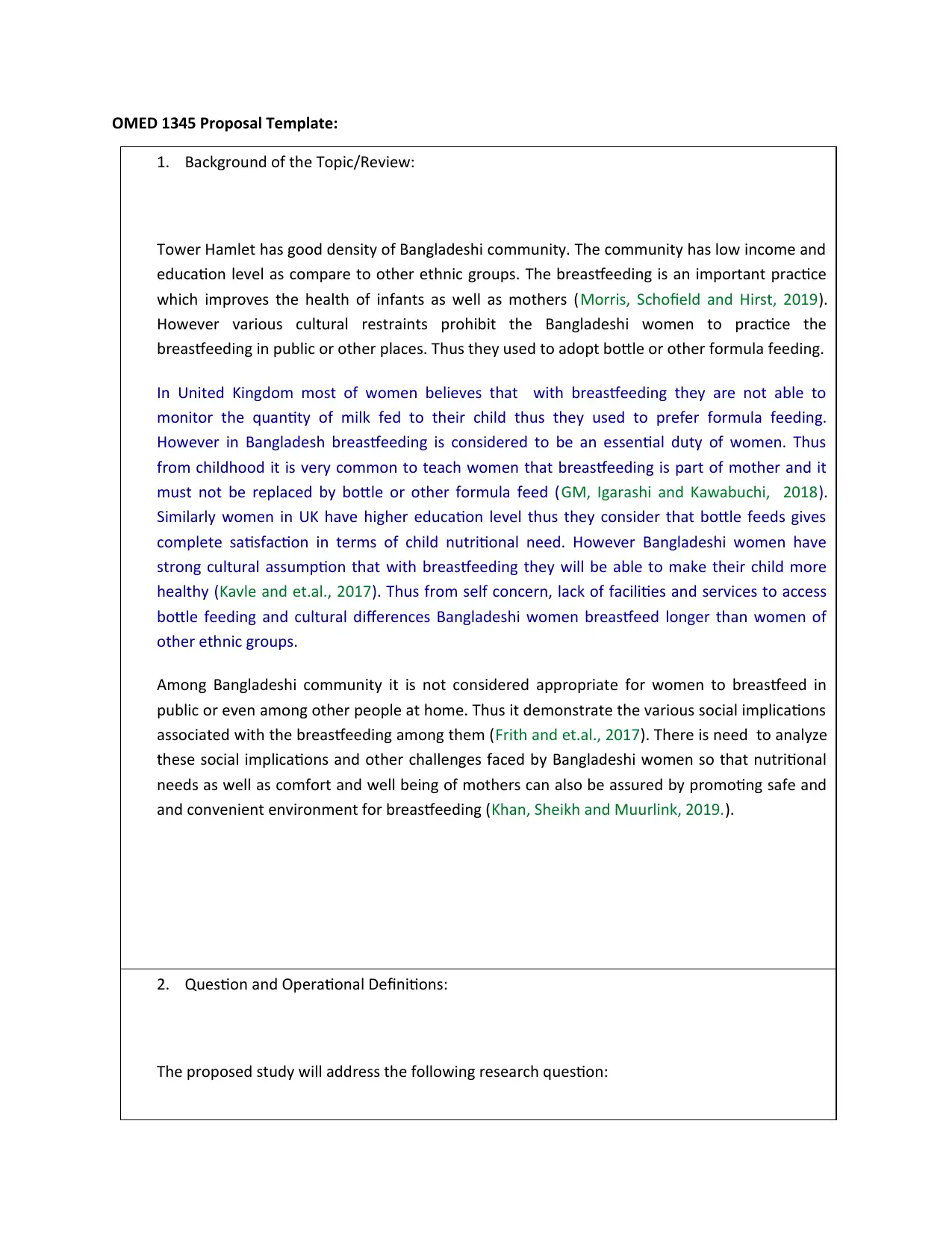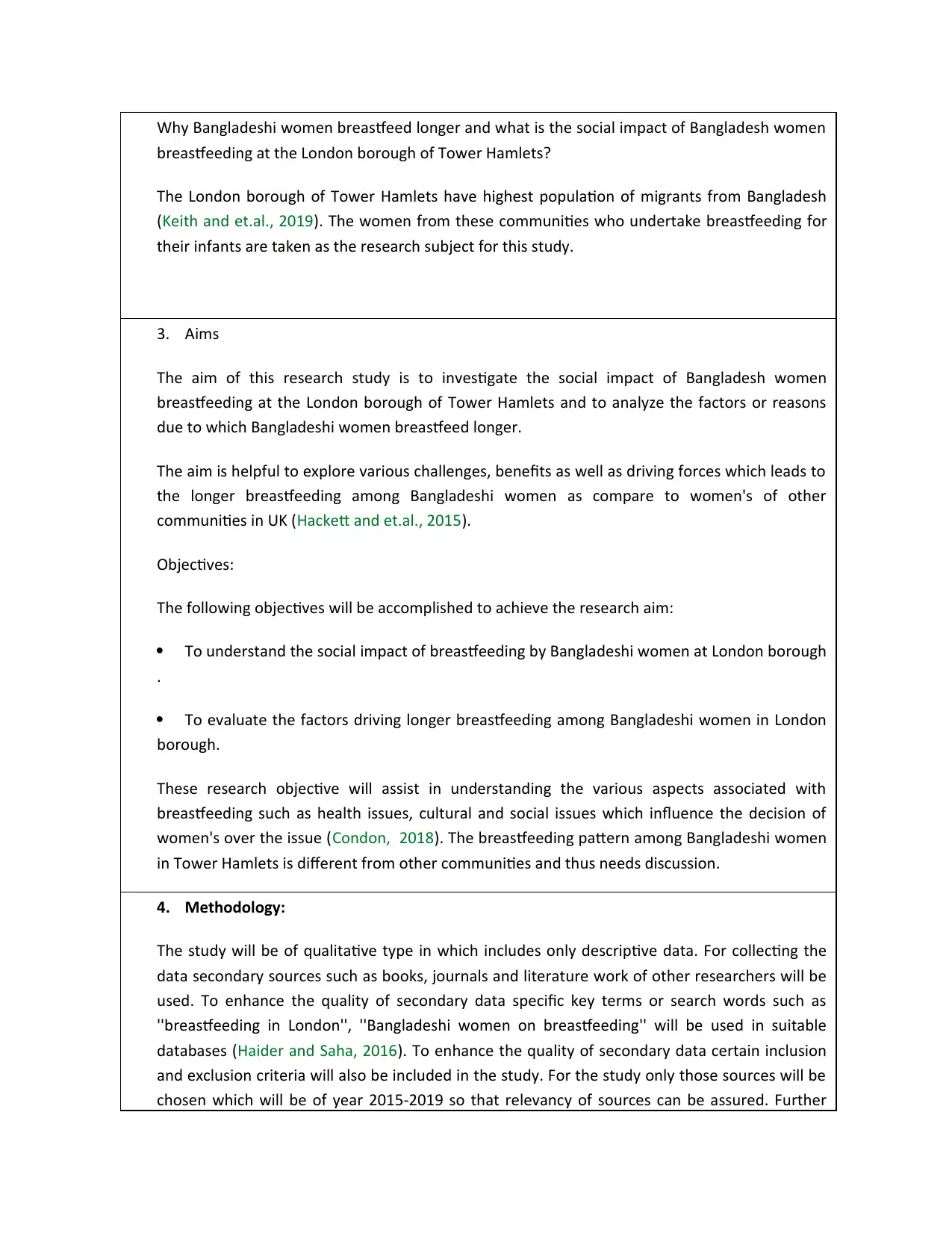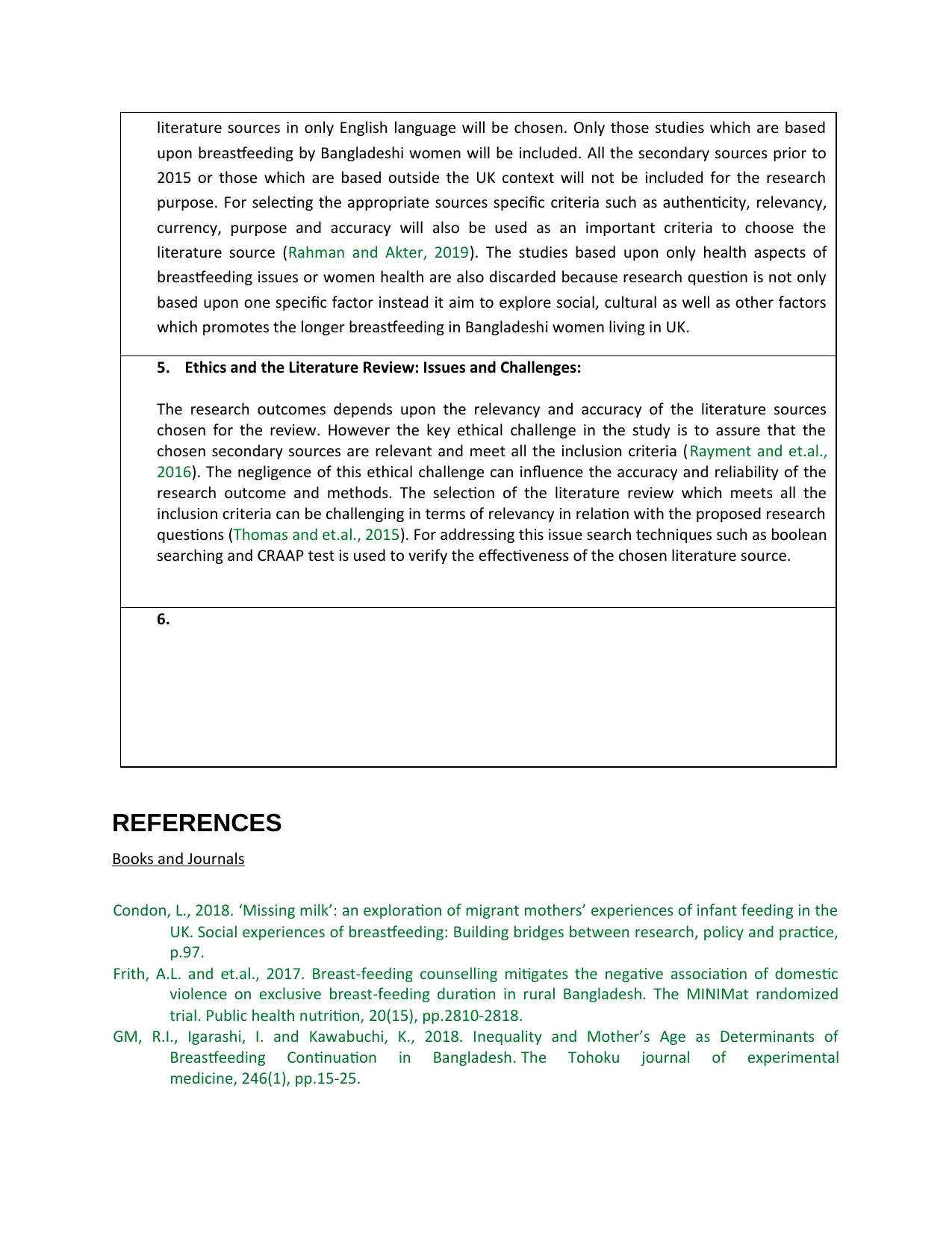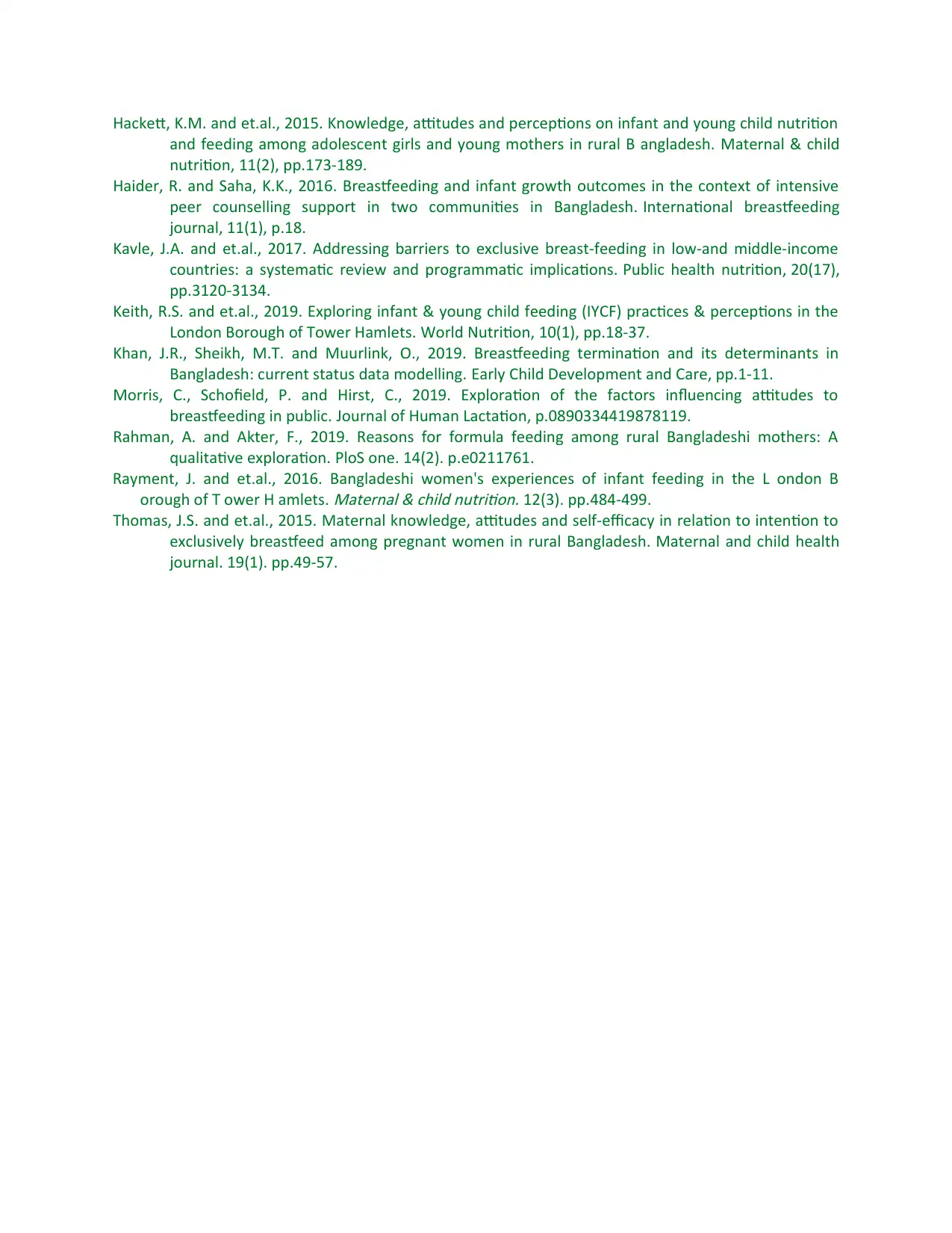OMED 1345: Social Impact of Breastfeeding in Tower Hamlets Proposal
VerifiedAdded on 2023/01/18
|4
|1494
|64
Report
AI Summary
This report is a research proposal focusing on the breastfeeding practices of Bangladeshi women residing in the London borough of Tower Hamlets. It investigates the social impact of breastfeeding and explores the factors contributing to longer breastfeeding durations within this community. The proposal outlines the background, highlighting the cultural restraints and socio-economic factors influencing breastfeeding decisions. The research question addresses why Bangladeshi women breastfeed longer and the associated social impacts. The study aims to analyze these factors, identify objectives to understand the social impact and evaluate the reasons behind extended breastfeeding. The methodology involves a qualitative approach utilizing secondary data from books, journals, and literature searches, with specific inclusion and exclusion criteria to ensure relevancy and accuracy. Ethical considerations and challenges related to literature selection are addressed, including the use of search techniques to verify the validity of chosen sources. The report concludes with a comprehensive list of references.

OMED 1345 Proposal Template:
1. Background of the Topic/Review:
Tower Hamlet has good density of Bangladeshi community. The community has low income and
education level as compare to other ethnic groups. The breastfeeding is an important practice
which improves the health of infants as well as mothers (Morris, Schofield and Hirst, 2019).
However various cultural restraints prohibit the Bangladeshi women to practice the
breastfeeding in public or other places. Thus they used to adopt bottle or other formula feeding.
In United Kingdom most of women believes that with breastfeeding they are not able to
monitor the quantity of milk fed to their child thus they used to prefer formula feeding.
However in Bangladesh breastfeeding is considered to be an essential duty of women. Thus
from childhood it is very common to teach women that breastfeeding is part of mother and it
must not be replaced by bottle or other formula feed (GM, Igarashi and Kawabuchi, 2018).
Similarly women in UK have higher education level thus they consider that bottle feeds gives
complete satisfaction in terms of child nutritional need. However Bangladeshi women have
strong cultural assumption that with breastfeeding they will be able to make their child more
healthy (Kavle and et.al., 2017). Thus from self concern, lack of facilities and services to access
bottle feeding and cultural differences Bangladeshi women breastfeed longer than women of
other ethnic groups.
Among Bangladeshi community it is not considered appropriate for women to breastfeed in
public or even among other people at home. Thus it demonstrate the various social implications
associated with the breastfeeding among them (Frith and et.al., 2017). There is need to analyze
these social implications and other challenges faced by Bangladeshi women so that nutritional
needs as well as comfort and well being of mothers can also be assured by promoting safe and
and convenient environment for breastfeeding (Khan, Sheikh and Muurlink, 2019.).
2. Question and Operational Definitions:
The proposed study will address the following research question:
1. Background of the Topic/Review:
Tower Hamlet has good density of Bangladeshi community. The community has low income and
education level as compare to other ethnic groups. The breastfeeding is an important practice
which improves the health of infants as well as mothers (Morris, Schofield and Hirst, 2019).
However various cultural restraints prohibit the Bangladeshi women to practice the
breastfeeding in public or other places. Thus they used to adopt bottle or other formula feeding.
In United Kingdom most of women believes that with breastfeeding they are not able to
monitor the quantity of milk fed to their child thus they used to prefer formula feeding.
However in Bangladesh breastfeeding is considered to be an essential duty of women. Thus
from childhood it is very common to teach women that breastfeeding is part of mother and it
must not be replaced by bottle or other formula feed (GM, Igarashi and Kawabuchi, 2018).
Similarly women in UK have higher education level thus they consider that bottle feeds gives
complete satisfaction in terms of child nutritional need. However Bangladeshi women have
strong cultural assumption that with breastfeeding they will be able to make their child more
healthy (Kavle and et.al., 2017). Thus from self concern, lack of facilities and services to access
bottle feeding and cultural differences Bangladeshi women breastfeed longer than women of
other ethnic groups.
Among Bangladeshi community it is not considered appropriate for women to breastfeed in
public or even among other people at home. Thus it demonstrate the various social implications
associated with the breastfeeding among them (Frith and et.al., 2017). There is need to analyze
these social implications and other challenges faced by Bangladeshi women so that nutritional
needs as well as comfort and well being of mothers can also be assured by promoting safe and
and convenient environment for breastfeeding (Khan, Sheikh and Muurlink, 2019.).
2. Question and Operational Definitions:
The proposed study will address the following research question:
Paraphrase This Document
Need a fresh take? Get an instant paraphrase of this document with our AI Paraphraser

Why Bangladeshi women breastfeed longer and what is the social impact of Bangladesh women
breastfeeding at the London borough of Tower Hamlets?
The London borough of Tower Hamlets have highest population of migrants from Bangladesh
(Keith and et.al., 2019). The women from these communities who undertake breastfeeding for
their infants are taken as the research subject for this study.
3. Aims
The aim of this research study is to investigate the social impact of Bangladesh women
breastfeeding at the London borough of Tower Hamlets and to analyze the factors or reasons
due to which Bangladeshi women breastfeed longer.
The aim is helpful to explore various challenges, benefits as well as driving forces which leads to
the longer breastfeeding among Bangladeshi women as compare to women's of other
communities in UK (Hackett and et.al., 2015).
Objectives:
The following objectives will be accomplished to achieve the research aim:
To understand the social impact of breastfeeding by Bangladeshi women at London borough
.
To evaluate the factors driving longer breastfeeding among Bangladeshi women in London
borough.
These research objective will assist in understanding the various aspects associated with
breastfeeding such as health issues, cultural and social issues which influence the decision of
women's over the issue (Condon, 2018). The breastfeeding pattern among Bangladeshi women
in Tower Hamlets is different from other communities and thus needs discussion.
4. Methodology:
The study will be of qualitative type in which includes only descriptive data. For collecting the
data secondary sources such as books, journals and literature work of other researchers will be
used. To enhance the quality of secondary data specific key terms or search words such as
''breastfeeding in London'', ''Bangladeshi women on breastfeeding'' will be used in suitable
databases (Haider and Saha, 2016). To enhance the quality of secondary data certain inclusion
and exclusion criteria will also be included in the study. For the study only those sources will be
chosen which will be of year 2015-2019 so that relevancy of sources can be assured. Further
breastfeeding at the London borough of Tower Hamlets?
The London borough of Tower Hamlets have highest population of migrants from Bangladesh
(Keith and et.al., 2019). The women from these communities who undertake breastfeeding for
their infants are taken as the research subject for this study.
3. Aims
The aim of this research study is to investigate the social impact of Bangladesh women
breastfeeding at the London borough of Tower Hamlets and to analyze the factors or reasons
due to which Bangladeshi women breastfeed longer.
The aim is helpful to explore various challenges, benefits as well as driving forces which leads to
the longer breastfeeding among Bangladeshi women as compare to women's of other
communities in UK (Hackett and et.al., 2015).
Objectives:
The following objectives will be accomplished to achieve the research aim:
To understand the social impact of breastfeeding by Bangladeshi women at London borough
.
To evaluate the factors driving longer breastfeeding among Bangladeshi women in London
borough.
These research objective will assist in understanding the various aspects associated with
breastfeeding such as health issues, cultural and social issues which influence the decision of
women's over the issue (Condon, 2018). The breastfeeding pattern among Bangladeshi women
in Tower Hamlets is different from other communities and thus needs discussion.
4. Methodology:
The study will be of qualitative type in which includes only descriptive data. For collecting the
data secondary sources such as books, journals and literature work of other researchers will be
used. To enhance the quality of secondary data specific key terms or search words such as
''breastfeeding in London'', ''Bangladeshi women on breastfeeding'' will be used in suitable
databases (Haider and Saha, 2016). To enhance the quality of secondary data certain inclusion
and exclusion criteria will also be included in the study. For the study only those sources will be
chosen which will be of year 2015-2019 so that relevancy of sources can be assured. Further

literature sources in only English language will be chosen. Only those studies which are based
upon breastfeeding by Bangladeshi women will be included. All the secondary sources prior to
2015 or those which are based outside the UK context will not be included for the research
purpose. For selecting the appropriate sources specific criteria such as authenticity, relevancy,
currency, purpose and accuracy will also be used as an important criteria to choose the
literature source (Rahman and Akter, 2019). The studies based upon only health aspects of
breastfeeding issues or women health are also discarded because research question is not only
based upon one specific factor instead it aim to explore social, cultural as well as other factors
which promotes the longer breastfeeding in Bangladeshi women living in UK.
5. Ethics and the Literature Review: Issues and Challenges:
The research outcomes depends upon the relevancy and accuracy of the literature sources
chosen for the review. However the key ethical challenge in the study is to assure that the
chosen secondary sources are relevant and meet all the inclusion criteria (Rayment and et.al.,
2016). The negligence of this ethical challenge can influence the accuracy and reliability of the
research outcome and methods. The selection of the literature review which meets all the
inclusion criteria can be challenging in terms of relevancy in relation with the proposed research
questions (Thomas and et.al., 2015). For addressing this issue search techniques such as boolean
searching and CRAAP test is used to verify the effectiveness of the chosen literature source.
6.
REFERENCES
Books and Journals
Condon, L., 2018. ‘Missing milk’: an exploration of migrant mothers’ experiences of infant feeding in the
UK. Social experiences of breastfeeding: Building bridges between research, policy and practice,
p.97.
Frith, A.L. and et.al., 2017. Breast-feeding counselling mitigates the negative association of domestic
violence on exclusive breast-feeding duration in rural Bangladesh. The MINIMat randomized
trial. Public health nutrition, 20(15), pp.2810-2818.
GM, R.I., Igarashi, I. and Kawabuchi, K., 2018. Inequality and Mother’s Age as Determinants of
Breastfeeding Continuation in Bangladesh. The Tohoku journal of experimental
medicine, 246(1), pp.15-25.
upon breastfeeding by Bangladeshi women will be included. All the secondary sources prior to
2015 or those which are based outside the UK context will not be included for the research
purpose. For selecting the appropriate sources specific criteria such as authenticity, relevancy,
currency, purpose and accuracy will also be used as an important criteria to choose the
literature source (Rahman and Akter, 2019). The studies based upon only health aspects of
breastfeeding issues or women health are also discarded because research question is not only
based upon one specific factor instead it aim to explore social, cultural as well as other factors
which promotes the longer breastfeeding in Bangladeshi women living in UK.
5. Ethics and the Literature Review: Issues and Challenges:
The research outcomes depends upon the relevancy and accuracy of the literature sources
chosen for the review. However the key ethical challenge in the study is to assure that the
chosen secondary sources are relevant and meet all the inclusion criteria (Rayment and et.al.,
2016). The negligence of this ethical challenge can influence the accuracy and reliability of the
research outcome and methods. The selection of the literature review which meets all the
inclusion criteria can be challenging in terms of relevancy in relation with the proposed research
questions (Thomas and et.al., 2015). For addressing this issue search techniques such as boolean
searching and CRAAP test is used to verify the effectiveness of the chosen literature source.
6.
REFERENCES
Books and Journals
Condon, L., 2018. ‘Missing milk’: an exploration of migrant mothers’ experiences of infant feeding in the
UK. Social experiences of breastfeeding: Building bridges between research, policy and practice,
p.97.
Frith, A.L. and et.al., 2017. Breast-feeding counselling mitigates the negative association of domestic
violence on exclusive breast-feeding duration in rural Bangladesh. The MINIMat randomized
trial. Public health nutrition, 20(15), pp.2810-2818.
GM, R.I., Igarashi, I. and Kawabuchi, K., 2018. Inequality and Mother’s Age as Determinants of
Breastfeeding Continuation in Bangladesh. The Tohoku journal of experimental
medicine, 246(1), pp.15-25.
⊘ This is a preview!⊘
Do you want full access?
Subscribe today to unlock all pages.

Trusted by 1+ million students worldwide

Hackett, K.M. and et.al., 2015. Knowledge, attitudes and perceptions on infant and young child nutrition
and feeding among adolescent girls and young mothers in rural B angladesh. Maternal & child
nutrition, 11(2), pp.173-189.
Haider, R. and Saha, K.K., 2016. Breastfeeding and infant growth outcomes in the context of intensive
peer counselling support in two communities in Bangladesh. International breastfeeding
journal, 11(1), p.18.
Kavle, J.A. and et.al., 2017. Addressing barriers to exclusive breast-feeding in low-and middle-income
countries: a systematic review and programmatic implications. Public health nutrition, 20(17),
pp.3120-3134.
Keith, R.S. and et.al., 2019. Exploring infant & young child feeding (IYCF) practices & perceptions in the
London Borough of Tower Hamlets. World Nutrition, 10(1), pp.18-37.
Khan, J.R., Sheikh, M.T. and Muurlink, O., 2019. Breastfeeding termination and its determinants in
Bangladesh: current status data modelling. Early Child Development and Care, pp.1-11.
Morris, C., Schofield, P. and Hirst, C., 2019. Exploration of the factors influencing attitudes to
breastfeeding in public. Journal of Human Lactation, p.0890334419878119.
Rahman, A. and Akter, F., 2019. Reasons for formula feeding among rural Bangladeshi mothers: A
qualitative exploration. PloS one. 14(2). p.e0211761.
Rayment, J. and et.al., 2016. Bangladeshi women's experiences of infant feeding in the L ondon B
orough of T ower H amlets.
Maternal & child nutrition. 12(3). pp.484-499.
Thomas, J.S. and et.al., 2015. Maternal knowledge, attitudes and self-efficacy in relation to intention to
exclusively breastfeed among pregnant women in rural Bangladesh. Maternal and child health
journal. 19(1). pp.49-57.
and feeding among adolescent girls and young mothers in rural B angladesh. Maternal & child
nutrition, 11(2), pp.173-189.
Haider, R. and Saha, K.K., 2016. Breastfeeding and infant growth outcomes in the context of intensive
peer counselling support in two communities in Bangladesh. International breastfeeding
journal, 11(1), p.18.
Kavle, J.A. and et.al., 2017. Addressing barriers to exclusive breast-feeding in low-and middle-income
countries: a systematic review and programmatic implications. Public health nutrition, 20(17),
pp.3120-3134.
Keith, R.S. and et.al., 2019. Exploring infant & young child feeding (IYCF) practices & perceptions in the
London Borough of Tower Hamlets. World Nutrition, 10(1), pp.18-37.
Khan, J.R., Sheikh, M.T. and Muurlink, O., 2019. Breastfeeding termination and its determinants in
Bangladesh: current status data modelling. Early Child Development and Care, pp.1-11.
Morris, C., Schofield, P. and Hirst, C., 2019. Exploration of the factors influencing attitudes to
breastfeeding in public. Journal of Human Lactation, p.0890334419878119.
Rahman, A. and Akter, F., 2019. Reasons for formula feeding among rural Bangladeshi mothers: A
qualitative exploration. PloS one. 14(2). p.e0211761.
Rayment, J. and et.al., 2016. Bangladeshi women's experiences of infant feeding in the L ondon B
orough of T ower H amlets.
Maternal & child nutrition. 12(3). pp.484-499.
Thomas, J.S. and et.al., 2015. Maternal knowledge, attitudes and self-efficacy in relation to intention to
exclusively breastfeed among pregnant women in rural Bangladesh. Maternal and child health
journal. 19(1). pp.49-57.
1 out of 4
Your All-in-One AI-Powered Toolkit for Academic Success.
+13062052269
info@desklib.com
Available 24*7 on WhatsApp / Email
![[object Object]](/_next/static/media/star-bottom.7253800d.svg)
Unlock your academic potential
Copyright © 2020–2026 A2Z Services. All Rights Reserved. Developed and managed by ZUCOL.


